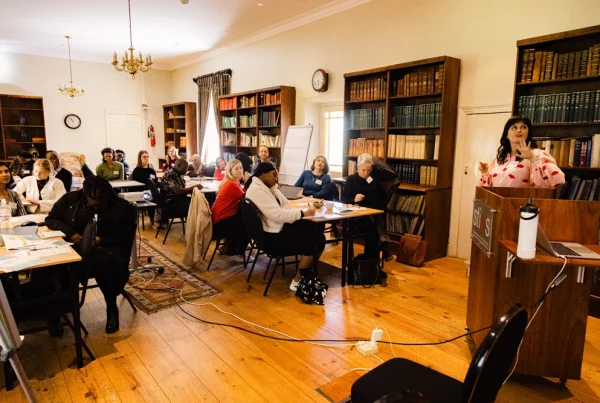Overview: South Africa is virtually unique among upper-middle-income countries in that most of our children (58%) do not learn to read for meaning in the first three years of school[1]. Without this core skill, they fall further and further behind as they are promoted into higher grades. While there are many reasons for this reading crisis one of the most prominent is that Foundation Phase teachers do not know (and have never been taught) how to teach reading. The “Funda Wande: Teaching Reading for Meaning” project aims to help address this course by developing a high-quality, free, open-access and SAQA-approved course: the ‘Certificate in Teaching Early Grade Reading.” All course materials will be available in isiXhosa (the pilot language) and subtitled in English. There will also be an English First Additional language sub-course. It is largely video-based with on-site coaches visiting teachers in their classrooms once every two weeks.
In the 21st Century, we live in a world that is inundated with written language, or ‘print’. We see it in our newspapers, on our contracts, on the screens of our cell phones and the pages of our school books. From the policies of government to the signs on our roads, it is the essential ingredient in modern life. Print is everywhere. And this is why reading is so important. Learning to crack the code of how we represent spoken language using symbols is a big part of why we go to school. We learn the differences between b and d, or between p and q. Moving from letters and syllables to words and sentences we can read about pirates, pigs and pixies or earth-quakes and igloos. Once we have cracked the code the possibilities are endless. This is the joy of being initiated into the literate world.
Aside from the practical importance of reading to make our way through the world, reading (and writing) is essential for participation in formal education since the ability to decode text, read with comprehension and learn from reading is the bedrock of most activities in institutions of learning. If reading is not mastered early on, progress in schooling is restricted. Unfortunately, nationally representative surveys (prePIRLS) show that more than half (56%)[2] of South African children do not learn to read fluently and with comprehension in any language by the end of Grade 4. But, as with most averages in South Africa, it hides huge inequalities. If we compare the wealthiest 10% of these learners with the poorest 50% the differences are astounding. Among the richest learners, 86% learn to read for meaning compared to less than 30% among the poorest half of learners. Why is this?
One of the main reasons behind this reading crisis is that our teachers have never been given meaningful learning opportunities to acquire this specialized knowledge, neither in their initial teacher training nor in subsequent in-service training. They often do not know what the various components of reading are (phonics, vocabulary, comprehension, fluency and motivation) or how these fit together into a cohesive whole. Many teachers are also confused about how to implement different reading methodologies like group-guided reading or shared reading. Currently, teachers focus on communalized activities like chorusing and offer very little differentiation or individualized instruction or assessment. There is also little formal teaching of vocabulary, spelling, writing or phonics and almost no understanding of how to develop the most important skill in reading: comprehension. Importantly, while the majority of our learners are learning to read in an African language (70%+), almost all universities only offer pre-service instruction on teaching reading in English.

To help fill this gap, we are designing a new course to help make sure that all Foundation Phase teachers in the country know how to teach reading in their home language and in English as a First Additional Language. The “Funda Wande: Teaching Reading for Meaning” project was initiated at the start of 2017 at the request of the Allan Gray Orbis Foundation Endowment Trustees and is now funded by the Endowment together with two funding partners: The Volkswagen Community Trust and the Millennium Trust. The course is currently being developed for two languages: isiXhosa and English First Additional Language. Using professionally filmed in-classroom videos, animations, info-graphics and other multi-media the course will teach the major components of reading and writing.
The 11 modules are: (1) How children learn to read, (2) Decoding in reading and writing, (3) Comprehension, (4) Vocabulary, (5) Children’s literature, (6) CAPS reading activities, (7) English as a First Additional Language, (8) Writing, (9) Reading assessment and remediation, (10) Inclusive education, and (11) Planning and progression. The course will be a credit-bearing Certificate accredited by the South African Qualifications Authority (SAQA). The course and all materials developed in the course will be openly licensed (Creative Commons) and freely available for anyone to use. It will be offered as a Certificate in Teaching Early Grade Reading by at least one public university in South Africa. The course will be evaluated in 2019-2021. If the evaluation of the course shows that it significantly raises teachers’ content knowledge and improves their teaching practice, and importantly raises the reading outcomes of the learners they teach – the mandate is to adapt the course and offer it in all of South Africa’s official languages. Ensuring that all teachers know how to teach reading and writing is the first step in ensuring that all South African children learn to read for meaning and pleasure.
If you are an expert in teaching early grade reading in isiXhosa and would like to be involved in the project or to find out more information please email me nicspaull[at]gmail.com
[1] This statistic is taken from one of the nationally-representative datasets of reading achievement in South Africa (prePIRLS, 2011). See Spaull (2016) for a fuller discussion of the results from the PIRLS and prePIRLS studies.
[2] Spaull, N (2016). Learning to read and reading to learn. Research on Socioeconomic Policy (RESEP) Policy Brief. Stellenbosch.
This piece was originally published by Nic as a guest blog post for the Alan Grey Orbis foundation, here.






